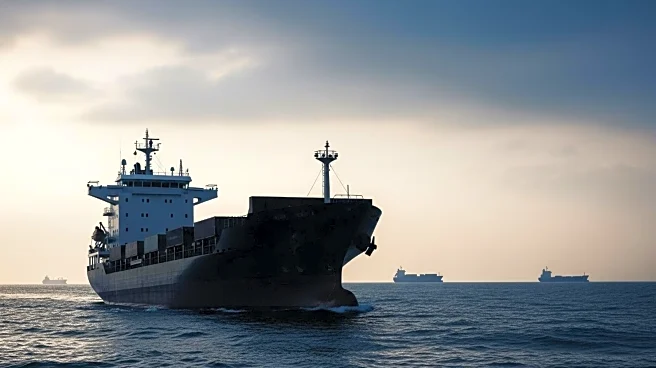What is the story about?
What's Happening?
New port charges from the US Trade Representative (USTR) targeting Chinese-built and China-based operators are set to take effect on October 14. Several major ocean carriers, including Ocean Network Express (ONE), HMM, CMA CGM, and Maersk, have announced they will not implement surcharges or service fees to offset these additional costs. These carriers have assured customers that they will maintain current US port rotations and service plans. Chinese carriers, such as COSCO, face more significant challenges due to these fees but remain committed to providing stable services in the US. Meanwhile, Hede Shipping has announced the closure of its HDS2 Pacific service due to the impact of the new regulations. The USTR measures could subject major carriers' fleets to $3.2 billion in port fees by 2026. In response, some companies, like Seaspan, are relocating headquarters and reflagging vessels to mitigate the impact.
Why It's Important?
The implementation of USTR port fees represents a significant shift in US trade policy, particularly affecting Chinese-linked shipping assets. This move could lead to increased operational costs for carriers, potentially impacting shipping rates and supply chain dynamics. The decision by carriers not to pass these costs onto customers reflects a strategic effort to maintain competitive pricing and service reliability. However, the broader implications could include strained US-China trade relations and potential retaliatory measures from China, which has already announced countermeasures targeting countries imposing discriminatory bans. The chemical industry, reliant on container ships for transporting polymers and other materials, may face disruptions due to these changes.
What's Next?
As the USTR fees take effect, carriers will continue to monitor regulatory changes and adjust strategies accordingly. The US Trade Representative is expected to provide further clarity on the fee structure and implementation details. China's countermeasures could escalate tensions, potentially affecting international maritime transport and related services. Stakeholders in the shipping industry will need to navigate these changes carefully, balancing cost management with service commitments. The situation may prompt further diplomatic negotiations or adjustments in trade policies between the US and China.
Beyond the Headlines
The introduction of USTR port fees highlights the complex interplay between international trade policies and global shipping operations. It underscores the potential for regulatory measures to influence market dynamics and geopolitical relations. The strategic responses by carriers, such as reflagging vessels and relocating headquarters, reflect broader trends in global business operations seeking to mitigate regulatory impacts. This development may also prompt discussions on the sustainability and resilience of global supply chains in the face of evolving trade policies.
















